Harold Halibut review
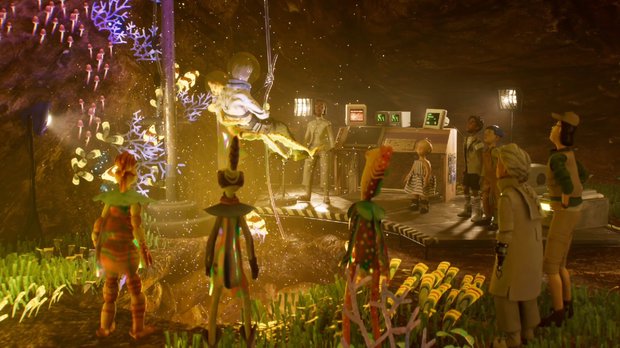
- 0 Comments
Stunning stop-motion adventure will immerse you in its hand-crafted characters and world, if not in its shallow gameplay
When you imagine a hero, you tend to think of some "chosen one" with the wits, natural gifts, or determination to do what others can't. Someone easy to admire, but probably hard to relate to. Well, Harold Halibut, eponymous star of the debut title from German studio Slow Bros., isn't like that at all. Living in a crashed spaceship on an alien world, surrounded by a curious mix of the marvellous and mundane, he's just a humble lab assistant, content to let others get on with the planning and the plotting while he daydreams and runs errands. When he does get drawn in despite himself, he winds up acting as a catalyst for some pretty life-changing events, but this is less grand sci-fi adventure and more quiet personal awakening. Harold Halibut definitely dances to the beat of its own drum, from the delightfully intricate stop-motion animation to the distinctive retro-futuristic world and slow-paced, personal narrative. Like Harold himself, it may be a little clumsy and naive at times, but it's also unique and utterly charming.
Back during the height of the Cold War, it must have been very tempting to build a giant spaceship and run away from it all. In our world, we didn't quite have the technology for that, but in Harold's an international group of scientists bankrolled by the Schlipmeier Corporation found a way to launch a space ark called the Fedora I into the great unknown. It's just a pity that the peach of a planet they picked out for our plucky explorers turned out to be covered in water, with a toxic atmosphere and absolutely no land. Having taken a couple of hundred years to get there, with few remaining resources and no other viable options, the vessel didn't so much land as crash into it, and the colonists have been there ever since, making lives for themselves beneath the waves.
It's now about 50 years later, and the Fedora has settled into a space-ified version of small-town life, governed by the mysterious and exceedingly bureaucratic All Water Corporation. Their tube transport system and its ever-changing charges is the bane of Harold's life, and as the story opens they've landed him in trouble. Again. I mean, how can you reasonably expect anyone to remember or care about their new turquoise credits? Or is it blue credits? Anyway, this means he's having to be bailed out by his boss, the ship's leading scientist Professor Jeanne Mareaux. Regularly exasperated by Harold's inability to keep track of even the simplest tasks, it’s just as well that she still has a motherly soft spot for him.
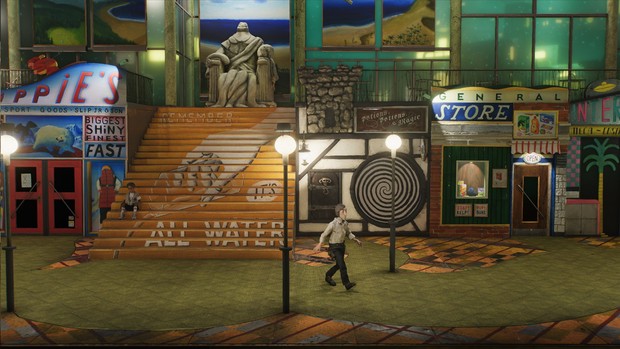
Harold's peaceful life of cleaning and fish feeding was never likely to stay that way for long, and before you know it he's become involved in a looming energy crisis. The ship’s power problems, and the effect they might have on plans to finally relaunch the ship, keep Mareaux and fellow scientist Cyrus bickering happily and spouting technobabble that sails gently over his head. Until, one day, the intake filters bring in a creature that's battered, bruised, but very definitely alien. Which changes everything for everyone on board, but especially for Harold.
The first thing you'll notice about Harold Halibut is its absolutely breathtaking world. Created using lovingly handbuilt models and sets, it looks like a cross between Aardman's early Wallace & Gromit animations and Thunderbirds. (If they were set underwater, in an exceedingly lived-in spaceship.) You can really feel the care and attention that went into every brushstroke on the shop signs, every bit of grime and gravel on the floors, and every stitch in Professor Mareaux's woolly jumper. You can tell this is a ship that's become a home, too, with the original dull metal corridors and bland, brutalist office spaces giving way to a new and airy shopping arcade with schools of fish swimming past its highly unspaceworthy all-glass walls and gaudy, hand-painted murals, not to mention a school and recreation area that’s got wood panelling, funky 60s angles and a disco ball. And that's before Harold has even visited the aliens on their own turf, which is a positively psychedelic experience.
It feels like you're experiencing a weird but beautifully crafted dollhouse, inhabited by marionettes pulled by invisible strings, and yet somehow also by real people. Maybe it's the impeccable voice acting, or maybe it's because every character feels so quirkily real. Like the gruff, rule-bound major who puts up a stern front but harbours a secret that betrays his soft heart. Or buff but gentle teacher Chris with his Turkish soap opera obsession. Or the ship's Captain-at-Large Zora who, having taken over after the crash, has never actually had to pilot the ship anywhere and spends his time holed up on the bridge, locked in a battle with impostor syndrome and feeding his wayward parrot. Harold himself is very much a square peg in a round hole, cursed with too much imagination for his simple job. You can tell that even Mareaux thinks he's kindly, well-meaning, but really quite stupid. But while it's true that he didn't get on too well at school, he slowly comes to realise that he's developing a rare kind of calm insight that might be more important.
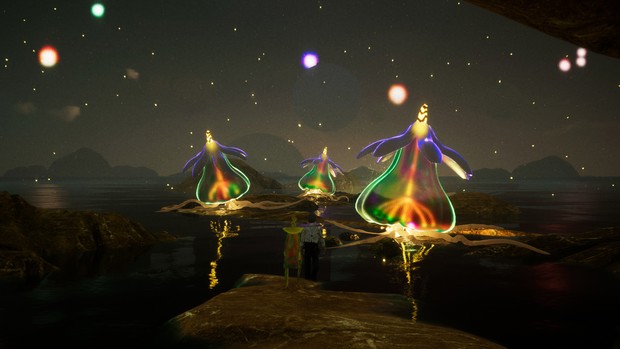
The music is similarly eccentric, with a widely varying but cinematic feel that takes in everything from pop and rock to orchestral strings and (my favourite) a low-key heist scene soundtracked by a very Turkish take on “Bella Ciao.” As in a movie, these pieces are used sparingly to highlight particular scenes; when Harold's merely exploring, simple ambient chords merge with the ship’s hisses and clanks to set the mood.
The Fedora is also packed with small details that flesh out its world, such as the TV in the lounge that intersperses episodes of Chris's favourite soap with adverts for everything from toothpaste to a fish restaurant. It's also worth stopping in at Gertrude's Bierhaus from time to time to hear the couple propping up the bar offer their hot take on the latest events. Or you could check out the kids' poetry readings downstairs in the Social District, or the interpretive dancer in the mall. It tickled me, too, that the captain's chair has wound up bolted to the top of the elevator, hoisting him up in the air every time you head to the bridge.
The crew of the Fedora have clearly been down here a while, and not just because nobody's reacting to the marvels they can see out the windows. They're so wrapped up in their own minor squabbles and shipboard politicking that even the news that Earth has survived after all doesn't create much more than a ripple, and the idea of finally, maybe heading home is only of mild interest. Against such a backdrop, the world-changing events you might expect to be front and centre kind of fade into the background, drowned by a tide of minor chores and everyday issues. Early on, this can feel slow and tedious, even with the artfully drawn characters and their personal dramas generously mixed in, but it's very much intentional, setting the scene for a touching resolution as Harold finally comes to realise what really matters to him. There's a liberal helping of dry humour, too, although it does occasionally sit awkwardly with the drama. For example, while Harold's fumbling attempts to understand alien culture put a big grin on my face, watching a fitness fanatic's video eulogy turn into one last aerobics class was difficult to watch.
It's just as well that the story is compelling, because the actual gameplay is fairly simplistic, mostly consisting of wandering the ship, talking to people and occasionally fiddling with machines while someone tells Harold what to do. A few tasks, such one where you connect some scientific equipment together and another involving tuning an oscilloscope, look vaguely puzzleish but are more about involving the player than actual challenge. You also have no real agency beyond deciding whether or not to follow up on some optional tasks; events will play out as they must, and you're just along for the ride. That's probably why the developers strongly encourage you to sit back and play with a controller, even on PC. It's best seen as a TV show with interactive elements, rather than a traditional game, especially given the length of some of the cutscenes. You absolutely can use a keyboard if you want, but I have to agree that it's best experienced from the couch if you can.
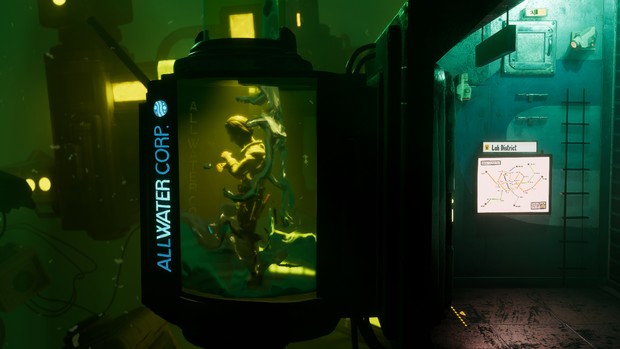
Either way, the interface is clean and streamlined: just steer Harold around with your thumbstick (or WASD keys if you must) and press a button to interact with people or objects when you get near enough for a Google Maps-style pin to pop up over them. While Harold does occasionally pick things up, there's no inventory as such; instead, he'll just use them when appropriate. He also has a PDA called Compu-Bud (drawn as an adorable grinning computer monitor) that tracks messages from his crewmates and maintains a to-do list, sitting alongside a sketchbook that slowly fills up with his charmingly childlike drawings of current events. This all works well enough, though I did sometimes look longingly at my mouse and wish I could just point and click, such as when Harold had to (for example) wave a mop around to clean up graffiti, or remove several screws from a panel. And especially when he had to use an in-game computer with a mouse-driven interface!
The Fedora isn't the biggest ship, and the tube system makes it pretty easy to get around, but you'll still spend quite a while meandering back and forth, especially as Harold walks painfully slowly (though he can be persuaded to break into a loping jog). Everything happens at the same languid pace, too, such as the way the tube capsule fills with water when Harold steps in, before flushing him away to the sound of blandly cheerful corporate slogans like “Thank you for choosing All Water!” (Not that he had any choice, but hey.) It’s startling and amusing the first few times, but begins to get almost as tedious as using real public transport after a while, and a fast travel system would have come in really handy.
You might think this deliberate slow burn would make for a dull experience, but it really doesn’t. It’s clearly not one for puzzle fiends, but I found there was just enough interaction to keep me invested in Harold, while the lack of challenge kept things cosy and helped me focus on the story. And what a long and winding tale it is: my first, fairly completist playthrough took almost 14 hours. That included some fairly substantial sidequests, to the point that a minimalist run would probably cut around five hours off that time, but then you'd miss many of the game's most touching moments. For example, you can choose to help the postman with a cache of letters that have been left stuck in the system for years by the ship's bureaucratic rules, bringing back memories and unravelling long-buried mysteries in the process. It’s also notable that in places it seems to be assumed that you have taken at least some interest in these tasks, leading to the odd emotional scene that otherwise would make little sense.
Even just wandering the ship, you'll find that people have plenty to say, and it's easy to become caught up in the local shopkeepers' petty rivalries or get waylaid by the aliens' curious questions. Where most games are content for their characters to stand around dispensing necessary information or send you to retrieve some MacGuffin or other, in Harold Halibut it feels like every character goes on their own small independent journey, whether it's Harold's ex Sunny shifting from job to job in her quest to find meaning in her life, the three Secretary brothers making peace with the black sheep of their family, or Chris coming to terms with the loss of a friend. Even uber-corporate Brenna Casselchop, CEO of All Water, eventually shows a glimmer of humanity. (Okay, she switches the company logo to a softer font after a storm of bad publicity, but baby steps.)
The aliens and their culture are a particular highlight, as they’re pretty much polar opposites of the Fedorans. Where the humans are uptight and bureaucratic, the aliens are cosmic hippies. Where the humans are curious and complicated, the aliens live simply in their cave and are (mostly) uninterested in anything beyond it. To Mareaux, they’re exciting research subjects who may also hold the key to the Fedora’s problems, but to Harold they quickly become friends who get him in ways no-one aboard ship ever has. Friends who may be very difficult to leave behind if and when the time comes.
Final Verdict
Harold Halibut is more interactive experience than game, but what an experience it is. The craft and imagination that went into literally building the world is incredible to behold, and the voice acting and cinematic soundtrack both fit perfectly. It’s also refreshing to see obvious sci-fi tropes sidelined in favour of smaller-scale, character-driven stories. That said, it can feel slow and meandering, especially without puzzles to solve or choices to make. I definitely wouldn’t have minded a little less backtracking and a little more to do, but I kept wanting to dive back in anyway, because as idiosyncratic as they are, the characters and world both felt so charmingly real and relatable. It’s definitely not for everyone, but if you’re willing to lean back, take your time and go with the flow, life aboard the Fedora I offers an experience that’s both alien and compellingly human.
Hot take
Harold Halibut is a curious fish, using its retro-futuristic, painstakingly handcrafted world and cast of weird but relatable characters to tell a heartfelt but ambling, puzzle-free story that’s (in the best way) more soap opera than space opera.
Pros
- Breathtaking, handcrafted world packed with life and detail
- Great voice acting and quirky cinematic soundtrack
- Rounded, believable characters with their own stories to tell
- Intriguing, multi-stranded story that gently builds to a satisfying conclusion
Cons
- Slow-paced, with much backtracking and busywork
- All those strands and side stories mean the narrative rambles a fair bit
- No real puzzles or significant choices
- Movement can feel awkward, especially without mouse controls
Peter played Harold Halibut on PC using a review code provided by the game's publisher.

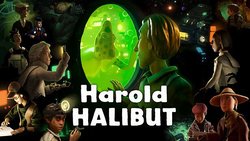
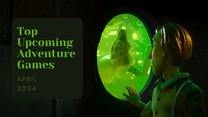



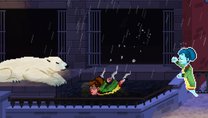


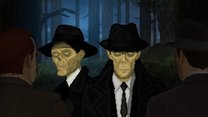
0 Comments
Want to join the discussion? Leave a comment as guest, sign in or register in our forums.
Leave a comment